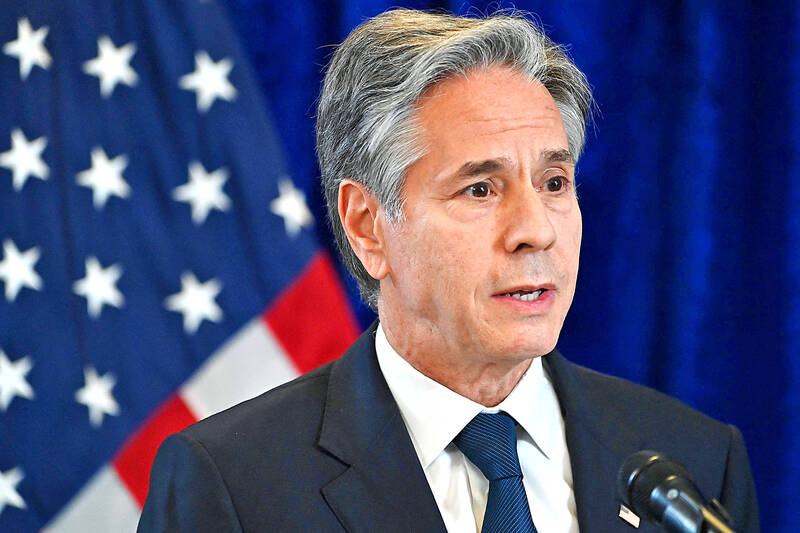US Secretary of State Antony Blinken yesterday warned China against taking any “provocative” action on Taiwan after Beijing’s reaction to President William Lai’s (賴清德) speech on Double Ten National Day on Thursday.
Blinken, speaking in Laos after an ASEAN East Asia Summit, called the speech by Lai, in which he vowed to “resist annexation,” a “regular exercise.”
“China should not use it in any fashion as a pretext for provocative actions,” Blinken told reporters. “On the contrary, we want to reinforce — and many other countries want to reinforce — the imperative of preserving the status quo, and neither party taking any actions that might undermine it.”

US Secretary of State Antony Blinken speaks at a news conference at the ASEAN summit in Vientiane yesterday.
Photo: AFP
“Fifty percent of commercial container traffic goes through the Taiwan Strait every day; more than 70 percent of the high-end semiconductors that the world needs are produced on Taiwan, so there’s a strong interest around the world on maintaining peace and stability, preserving the status quo, avoiding any kind of conflict that could disrupt things that are so essential to the global economy,” he said.
In Taipei on Thursday morning, Lai said at the nation’s main National Day event that the Republic of China (ROC) and the People’s Republic of China (PRC) not being subordinate to each other is an objective fact and the “status quo” across the Taiwan Strait.
He also said that Taiwan is willing to work with China to address climate change, prevent infectious diseases and maintain regional security in pursuit of peace and shared prosperity that would benefit people on both sides.
Former American Institute in Taiwan chair Richard Bush described Lai’s speech as “moderate,” as it did not say much about the PRC military and coercive threats.
However, Bush said he worried that Beijing would not have a positive response based on its “united front” logic and its mistrust of Lai’s Democratic Progressive Party.
Former US National Security Council director for China Rush Doshi on Thursday wrote on X that “Lai has taken a step toward stability.”
“So the question now is whether Beijing wants to respond with escalation or its own restraint,” he said.
Meanwhile, the Mainland Affairs Council (MAC) urged Beijing to understand the goodwill in Lai’s speech and face mainstream public opinion in Taiwan.
“The so-called one China principle proposed by the Chinese Communist Party does not leave room for the survival of the ROC and has been firmly rejected by the Taiwanese people,” the MAC said.
In line with Lai reaffirming his hope for the resumption of equal, healthy and orderly exchanges between the two sides, Taipei has taken several measures to promote cross-strait exchanges, including providing assistance to Chinese officials and businesses to attend July’s cross-strait summer travel expo in Taipei, it said.
Earlier on Thursday, Chinese Ministry of Foreign Affairs spokeswoman Mao Ning (毛寧) said that Lai had tried to “sell the fallacy of Taiwan independence,” and accused him of revealing “his pernicious intention to escalate tensions across the Taiwan Strait for political gain.”
“Lai’s speech deliberately seeks to sever the historical connection between the two sides of the strait and reiterated the rhetoric of mutual non-subordination and insisting on sovereignty,” Mao said.
The “one China” principle says that Taiwan is an indivisible part of China’s territory, she said.
“No matter what Lai’s administration says or does, it cannot change the objective fact that both sides of the Taiwan Strait belong to one China,” she added.
Source: Taipei Times - 2024/10/12




















